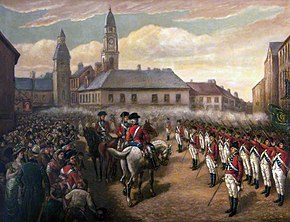 Henry Grattan (1746 - 1820)
Henry Grattan (1746 - 1820)
One of the greatest advocates on Ireland’s side during the latter half of the eighteenth century, Grattan, though a Protestant, supported Ireland’s right to self-governance, though he still believed it should always pay homage to the English king. Under Poynings Law (1494) no legislation could be passed in Ireland until it had gained the approval of the English Privy Council, and in fact laws could be passed pertaining to Ireland by the English government without any involvement of the Irish Parliament, making it entirely dependent on, and subservient to, the Crown. Grattan intended to have this ancient law abolished, so that Irish matters could be decided by Irishmen, or at least, Anglo-Irish, as Catholics - what you would have to call the true Irish - were still banned from holding any public office by the Penal Laws still in force, and that most definitely included sitting in Parliament. Grattan was a patriot, born in Dublin and having studied at Trinity College, and quickly rising to the leadership of the Irish Patriot Party, which stood in strong opposition to what was known as the Castle Party, those hardline Protestants who wished England to retain total control over Irish legislation and fought any efforts to the contrary.
Grattan took his seat in the Irish Parliament in 1775. A year later, England was having serious trouble with another, younger colony, and events in Ireland began to take something of a back seat, less important now than bringing the upstart America to heel. Partly as a response to this, and also using the absence of British troops as a springboard to further their own political agenda, the Volunteers were formed.
 The Volunteers
The Volunteers
When British troops were sent to the colony to fight in what would become the American War of Independence, wealthy landowners feared for their own safety and that of their property, worrying about who and what would fill the power vacuum which opened up. I guess it’s easiest to equate the Volunteers with the British Home Guard that ostensibly protected Britain from Nazi invasion during the Second World War. They were held in contempt by the regular army, who deemed them as barely fit for service and ensured they were given the crappiest and most menial jobs they could be given; their commitment was questioned, as was their courage. They were basically militias of Protestant (obviously: at this point the Penal Laws still forbade Catholics to carry arms, and while the secret societies already discussed may have got around that, there could be no official sanction for arming Catholics) who feared Spanish or French invasion of Ireland, believing that England’s traditional enemies might take advantage of the bulk of His Majesty’s forces being abroad. There were however some Catholics and Presbyterians admitted after the Catholic Relief Act of 1778.
With the British victory over the Spanish in 1780 the fears of invasion dissipated, and the Volunteers turned to political aims, intending to gain concessions for Ireland, such as free trade with Britain, and with their power growing the British government acceded to their demands. The chapters in Ulster seem to have been the most militant, calling for Irish legislative independence (while of course remaining loyal to the king) and between pressure from them and Grattan (no I haven’t forgotten who I’m writing about) what was known as the Constitution of 1782 came to be, and the largely autonomous parliament that ruled - for a few short years - was known as Grattan’s Parliament.
Grattan’s Parliament
While it would take another 150 years before Ireland would gain her total independence, the Constitution of 1782 was the first major step in freeing her from the bondage of the English Crown. Since Norman times the Irish Parliament had acted only under the sufferance of the monarch, effectively an arm of the English government. Therefore no laws could be passed there without the approval of the king or queen, which meant of course no laws the English government did not agree with. Grattan was, however, loyal to the Crown and wished to preserve the connection with England, just not be at its whim. He was also for Catholic emancipation, which as you can imagine did not go down well across the water. Or indeed in Ireland, at least with the landed classes, who had made their money off the backs of poor Catholics, either as servants (virtual slaves with few if any rights) or by possessing their land for themselves. Equal rights for Catholics was most assuredly
not on the Protestant agenda!
Nevertheless, when the Roman Catholic Relief Act of 1791 was passed in the British Parliament, Grattan managed to get an Irish version passed only two years later, which eased pressure on Irish Catholics, allowing them into some public offices and to be educated, but the king’s stubborn refusal to even countenance the freedom of his Catholic subjects would explode in violence and uproar seven years later.